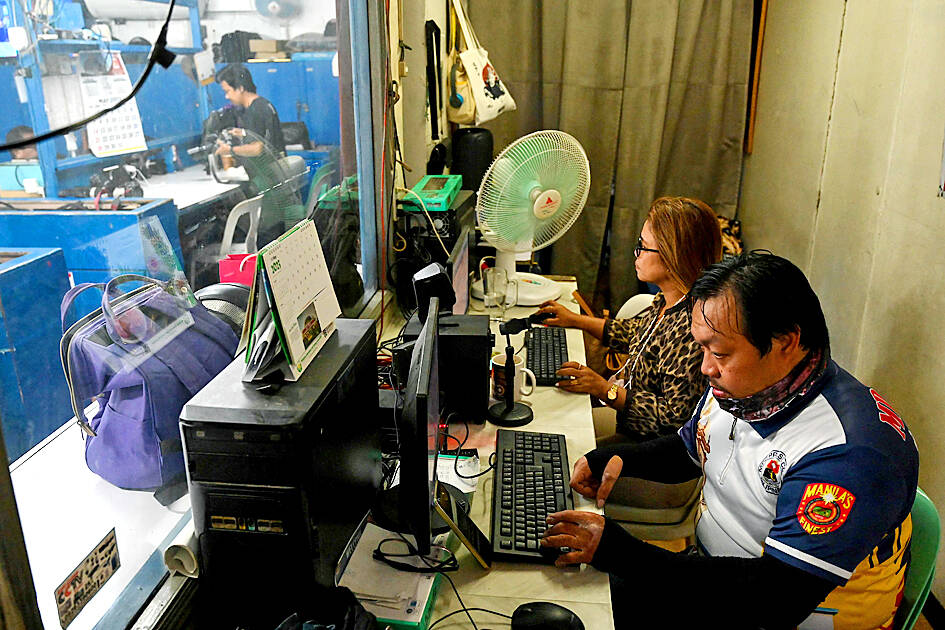Journalism is being battered by propaganda and increasingly sophisticated fakes, aided by artificial intelligence (AI) software and a failure of oversight from tech companies, Reporters Without Borders (RSF) said yesterday.
Overall, the environment for journalists was rated as “bad” in 70 percent of the 180 countries in the non-governmental organization’s annual ranking, and “good” in just eight countries.
Norway and North Korea remain best and worst respectively, for press freedom, according to the 21st annual report, which was published on World Press Freedom Day.

Photo: AFP
This year, RSF focused on the myriad forms of misinformation that are “drowning out” trustworthy news — a problem compounded by the rapid evolution of AI.
“It is the tech industry that allows disinformation to be produced, distributed and amplified,” RSF secretary-general Christophe Deloire said.
“Reliable information is drowned in a deluge of disinformation,” Deloire added. “We are less and less able to perceive the differences between the real and the artificial, the true and the false.”
A prime example was Elon Musk, who took over Twitter late last year, he said.
The report criticizes his new paid-for verification system, saying Musk was pushing “an arbitrary, payment-based approach to information to the extreme.”
The report used the example of Midjourney, an AI program that generates high-quality images that are “feeding social media with increasingly plausible and undetectable fake ‘photos,’” such as those of former US president Donald Trump being manhandled by police and a comatose Julian Assange in a straitjacket that recently went viral.
Traditional forms of political interference are also gaining ground in many countries, RSF said.
About two-thirds of countries have political actors who are “often or systematically involved in massive disinformation or propaganda campaigns,” it said, highlighting the cases of Russia, India and China.
They are assisted by a vast disinformation industry.
RSF recently supported a consortium of investigative journalists working on “Forbidden Stories,” a project which uncovered the activities of Israeli firm “Team Jorge,” which specializes in producing disinformation.
The worst countries in the new ranking, apart from North Korea, were Vietnam, “which has almost completed its hunt of independent reporters and commentators,” and China, “the world’s biggest jailer of journalists.”
India fell from “problematic” to “very bad,” thanks to “media takeovers by oligarchs close to Prime Minister [Narendra] Modi”, and also in Turkey, where the government “has stepped up its persecution of journalists in the run-up to elections scheduled for 14 May.”
The US fell three places to 45th, in part due to a deteriorating security situation for journalists. The biggest drops were Peru (down 33 places to 110), Senegal (down 31 to 104) and Haiti (down 29 to 99th). Brazil, rose from 18 places to 92 thanks to the departure of far-right president Jair Bolsonaro.
The Middle East and North Africa remain the most dangerous region for journalists, while Europe remains the safest, although attacks on journalists in Germany led it to fall five places, RSF said.
The ranking is compiled by combining data on abuses committed against journalists with hundreds of surveys sent to journalists, academics and human rights activists.

Kehinde Sanni spends his days smoothing out dents and repainting scratched bumpers in a modest autobody shop in Lagos. He has never left Nigeria, yet he speaks glowingly of Burkina Faso military leader Ibrahim Traore. “Nigeria needs someone like Ibrahim Traore of Burkina Faso. He is doing well for his country,” Sanni said. His admiration is shaped by a steady stream of viral videos, memes and social media posts — many misleading or outright false — portraying Traore as a fearless reformer who defied Western powers and reclaimed his country’s dignity. The Burkinabe strongman swept into power following a coup in September 2022

‘FRAGMENTING’: British politics have for a long time been dominated by the Labor Party and the Tories, but polls suggest that Reform now poses a significant challenge Hard-right upstarts Reform UK snatched a parliamentary seat from British Prime Minister Keir Starmer’s Labor Party yesterday in local elections that dealt a blow to the UK’s two establishment parties. Reform, led by anti-immigrant firebrand Nigel Farage, won the by-election in Runcorn and Helsby in northwest England by just six votes, as it picked up gains in other localities, including one mayoralty. The group’s strong showing continues momentum it built up at last year’s general election and appears to confirm a trend that the UK is entering an era of multi-party politics. “For the movement, for the party it’s a very, very big

ENTERTAINMENT: Rio officials have a history of organizing massive concerts on Copacabana Beach, with Madonna’s show drawing about 1.6 million fans last year Lady Gaga on Saturday night gave a free concert in front of 2 million fans who poured onto Copacabana Beach in Rio de Janeiro for the biggest show of her career. “Tonight, we’re making history... Thank you for making history with me,” Lady Gaga told a screaming crowd. The Mother Monster, as she is known, started the show at about 10:10pm local time with her 2011 song Bloody Mary. Cries of joy rose from the tightly packed fans who sang and danced shoulder-to-shoulder on the vast stretch of sand. Concert organizers said 2.1 million people attended the show. Lady Gaga

SUPPORT: The Australian prime minister promised to back Kyiv against Russia’s invasion, saying: ‘That’s my government’s position. It was yesterday. It still is’ Left-leaning Australian Prime Minister Anthony Albanese yesterday basked in his landslide election win, promising a “disciplined, orderly” government to confront cost-of-living pain and tariff turmoil. People clapped as the 62-year-old and his fiancee, Jodie Haydon, who visited his old inner Sydney haunt, Cafe Italia, surrounded by a crowd of jostling photographers and journalists. Albanese’s Labor Party is on course to win at least 83 seats in the 150-member parliament, partial results showed. Opposition leader Peter Dutton’s conservative Liberal-National coalition had just 38 seats, and other parties 12. Another 17 seats were still in doubt. “We will be a disciplined, orderly